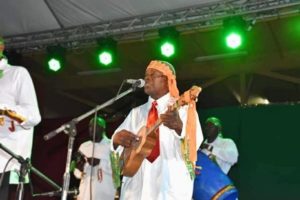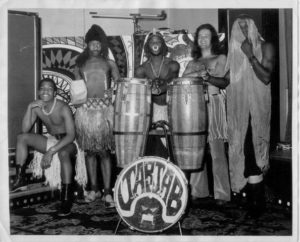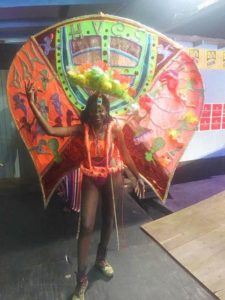|
Getting your Trinity Audio player ready...
|
Reading Time 11 mins

Uncle Winston performing with his band, BBH, at the December, 2016 Carriacou Parang Competition. BBH placed third that year.
On hearing of the transitioning of Uncle Winston last December, I began reflecting on the great fortune I had of meeting him in Carriacou and playing parang in his band for four seasons. His presence factored in my celebrating him in “The Parang Diaries” within these pages in “Deep Connection Between People, Land, and Sea”(BDN, December, 2019). Now, I situate him in a wider context with this tribute which jumps off from some tangential Caribbean sightings that have been in my field of vision lately.
_ _ _ _ _ _ _ _ _
When I stumbled upon the extended podcast of a Yale University course on the Civil War and Reconstruction, my friend Kit (a recently retired college professor) and I got to talking about the history of slavery, the history of abolition, the abolishing of the slave trade, and the Caribbean and the American South as two of the five big slave societies.
The lecturer, David Blight, identified Greece, Rome, Brazil, the American South, and the Caribbean as the
five societies where everything was informed by slavery. For instance, in a slave society, there would be certain kinds of labor that only a slave would do, that a free person would not consider
 doing. Blight is also the author of the 2018 Pulitzer Prize-winning biography of Frederick Douglass, which I’m about 100 pages into. That also informs some of my talks with Kit.
doing. Blight is also the author of the 2018 Pulitzer Prize-winning biography of Frederick Douglass, which I’m about 100 pages into. That also informs some of my talks with Kit.
Somehow, Kit and I ended up thinking about Caribbean intellectuals. Recently I got to know someone from the region, with a questing intellect, who introduced me to the names and works of these writers such as Derek Walcott, CLR James, Merle Collins, Kamau Braithwaite, Sylvia Wynther, and Eric Williams among others. Kit knows them from teaching Comparative Literature. It’s a whole new can of worms for us to explore, both their ideas and their complicated relationship with the mother country. Kit introduced me to the term subaltern studies, an element of Caribbean scholarship.
* * *
Winston’s… embodiment of tradition… and his bold, natural use of cultural signifiers and the world around him makes me think a little differently of the year in US politics, culminating in the inauguration which feels so renewing. Uncle Winston was not afraid of turning the world around him into calypso and carnival and performance.
* * *
When my family and I were sailing in the Caribbean in 2016, a family from Berkeley visited us. They have three kids, like us. They are more activist than we are, fostering kids from Africa and assiduously modeling for their children how to save the planet and make a better world. The husband is a labor union organizer. They met us in St. Lucia where they stayed at a hotel. We stayed on our boat and we’d get together exploring the island. Then we migrated to Guadeloupe; they by ferry and we by Penguin (our 40’ sailboat).
In Guadeloupe, they’d rented a permanently-moored houseboat that was solar powered and eco-friendly and cool. We anchored not far from them and we continued our interaction. One of the things they brought to the mix was their awareness that a Museum had just opened in Pointe a Pitre dedicated to the history of slavery world-wide.
We visited the museum, which was very well curated and full of cutting-edge video and computer technology in a sleek, French way. I mention that because during my listening to the Civil War course, I was reminded that I had visited the Slavery Museum in Guadeloupe.
* * *
As an outsider fortunate enough to participate in the Carriacou Parang Festival Competition four times, I see that some of my awareness of Parang had to do with current events of the time. Many events were local and unintelligible to me (however, I learned enough to pity whoever was the bank teller in 2004 who was referenced by every band that year), but in the verses of Winston David the names Bin Laden, Obama, and Hurricane Ivan found easy rhymes and I was able to remember them.
Here is a verse of Uncle Winston’s from the BBH Serenaders 2009 Parang mele piece. BBH won the competition that year, part of a four-year streak of wins:
“Obama is the man in the White House
Everybody running off their mouth…
Up till now the things can’t get better…
Everything they blaming Obama
As if to say the man is Messiah
Ever since the nine-eleven
Up till now we can’t find Bin Laden…”
Uncle Winston passed away on December 14, 2020. I write this on the day of the Joe Biden/Kamala Harris Inaugural, with some of that tradition and performance still fresh in mind. Reflecting on someone with Winston’s entertainment chops; his embodiment of tradition; and his bold, natural use of cultural signifiers and the world around him makes me think a little differently of the year in US politics, culminating in the inauguration which feels so renewing. Uncle Winston was not afraid of turning the world around him into calypso and carnival and performance. His having been in the world is a small gravitational force tugging at current events.
I did not know Winston David as well as someone who grew up in Carriacou, but he was someone whom I paid attention to and someone whose story, which I tried to piece together from bits I gathered here and there, interested me. At times I chase down Carriacou evidence online and find information to compliment my personal, on-the-ground experience. Having learned about Winston’s passing from two band members, Sherman Cudjoe and Justin Herry, I searched until I found a memorial tribute on the Carriacou Culture Train String Band Group Facebook Page. There I learned new things to add to my trove of Uncle Winston lore.
I knew he had lived and worked in England before returning to Carriacou to open his bakery and take up Parang. In the rehearsal space, on the wall, there had been a black and white publicity photo of a band dressed in matching suits,  halfway between the Beatles and James Brown. Winston played electric bass in that band. Now, I know the town where he had lived in the 1970s was Huddersfield, a market town in West Yorkshire, 24 miles northeast of Manchester.
halfway between the Beatles and James Brown. Winston played electric bass in that band. Now, I know the town where he had lived in the 1970s was Huddersfield, a market town in West Yorkshire, 24 miles northeast of Manchester.
The Wikipedia entry tells me, “a legacy of being a former greater mill town is that Huddersfield is more ethnically diverse than the national average. The white population made up 81% of the population compared to 91.3% for England as a whole (in 2001).” It reminds me of the Windrush generation and Lord Kitchener who migrated to England in 1948 and lived there from 1948 until 1962 when he returned to Trinidad. Now I imagine a younger Winston, living in Northern England, bundled up pragmatically against the cold (average January temperature of 42 degrees Fahrenheit), part of a West Indian community drinking Jack Iron, the 70 proof Carriacou rum that was always present at Parang rehearsals.
* * *
In the memorial page, there are photographs—Winston playing with BBH, Winston with two adult children aboard the Osprey (the ferry from Grenada to Carriacou), Winston playing with a grandson, Winston the baker decorating a cake, photos of Carnival costumes he created. There was the band publicity photo I had seen at rehearsals. And there were three photos of Winston in another band called JabJab.
These photos show three West Indian guys and a white Brit, all dressed like bearers in a Hollywood B movie set in Africa, all pretty confident in their masquerade of grass skirts, bare chests, and beads. Of course, nobody bothers to take off their wristwatches or Beatles boots, because you’re not real; you’re referencing Africa for band identity. One of the photos shows them in performance, playing guitar, bass guitar, and a synthesizer and backed by the big amplifiers of the era. The others emphasize conga drums and a bass drum with the JabJab logo.
When I saw these photos, after being initially a little appalled, I came to love them for the complexity of what they say. In 1965, the Mighty Sparrow had already gone down this road of faux-African stereotyping with the song Congo Man (which was banned from Trinidad radio until 1989). To me, the photos of JabJab speak to how unhesitatingly Winston embraced the role of performer.
I read in John Storm Roberts’ Black Music of Two Worlds that traditional African music made no distinction between the performer and the audience. People experienced traditional African music as participants—singing , dancing, drumming. The same is largely true in Carriacou, certainly in Parang music. Everybody plays, dances, sings, or, during the competition, screeches and heckles. One can simply watch and listen to the music, but there is often a large participatory component to the music.
When I think of Winston through this lens, I realize that he performed (and created costumes and wrote verses and rehearsed bands) not to show off, but to experience and be a part of his community and his identity. That identity encompassed many facets—African dress-up, British pop style, Parang costumes (in the competition the best-costumed band won a specific money prize), Carnival costumes. I think he was by nature proud and potentially adversarial. There are musicians in Carriacou who will play at the drop of a hat. I’m not sure Winston was one of those—he enjoyed the frame provided by the competition.
* * * *
 I met Winston David in December of 2001, when I first played with the BBH Serenaders. I had come to Carriacou aboard my sister’s schooner. We had sailed from Ireland, Spain, Portugal, the Canary Islands, the Cape Verde Islands, then across the Atlantic to Barbados, Bequia, and now Carriacou on our way to haul the boat in Grenada.
I met Winston David in December of 2001, when I first played with the BBH Serenaders. I had come to Carriacou aboard my sister’s schooner. We had sailed from Ireland, Spain, Portugal, the Canary Islands, the Cape Verde Islands, then across the Atlantic to Barbados, Bequia, and now Carriacou on our way to haul the boat in Grenada.
As soon as I arrived in Hillborough, I became aware of how much music was going on there. I met 87-year-old Canute Caliste at the Carriacou Historical Society Museum in Hillborough and he strummed aggressively on my Polynesian ukulele, which fingers just like the local cuatro. Clemencia, Canute’s daughter and the museum’s curator, suggested I look up her uncle, Sunnel Allert, in L’Esterre to play guitar with. I found Sunnel and we made music. He and his daughter came out to my sister’s schooner and his daughter played with my two nieces, swinging into the water off the rope swing hung from Alcyone’s yard. And, Sunnel let slip to my brother-in-law, the captain, that he, Sunnel, had been the first mate aboard cargo vessels sailing between Grenada and Carriacou in the 1950s.
In December, Parang time, there is music everywhere in Carriacou. Because I genuinely like to play music with almost anyone I encounter, I found many opportunities to play. Ultimately, someone convinced me to stay in Carriacou while my sister’s boat continued on to Grenada. I could catch up with them later.
I found a guesthouse and settled in, playing music at every opportunity. Eventually, someone told me that a band in Belmont, at the south end of the island, might need a guitarist. I went to the Cam Flaa Bakery, met Uncle Winston, and waited for the rest of the band to show up for rehearsal. The band was called the BBH Serenaders. BBH, as I understand it, stands for Belmont, Belview, and Harvey Vale, three towns on the south end of the island from whose ranks the band’s principal members came. It was obviously part of the social, cultural life of that part of the island because lots of people hung out at and around the large room/garage/shed next to the Cam Flaa Bakery where we rehearsed.
This was all new, exotic stuff for me and my eyes and ears were wide open trying to figure everything out. My ears didn’t always serve me well, because, not being local, I rarely understood the rapid-fire discussions that went on as men loudly and excitedly interjected their two cents as to how things should go. I couldn’t be sure who was in the band and who was a friend of the band, someone there to hang out because it was the liveliest thing going on that afternoon. But I could hear the music, find good ways to add my three chords, and help goose the rhythm.
Visually, I noticed two things: There were some elaborately constructed carnival costumes stored in recesses of the room. And there was an old black and white publicity photo of a band hanging on the wall.
As to Uncle Winston, he was compact and no-nonsense. He was obviously in control, to the degree that anyone in that chaotic assemblage of ebullient expression could be in control. He had a vision of how the songs we rehearsed should go and he was whipping the band and performance into shape so it would reflect his vision. He played cuatro, a four-stringed ukulele-relative that comes from Venezuela. I’m not sure when I first noticed it, but he was missing the thumb on his right hand, and consequently, younger band members referred to him (out of his hearing) as “Fingers.” Musically Winston could drive the band with his cuatro, although he had help from Ashbah, the young banjo player who was a demon with the triplet pattern that drives a good Parang band.
This is a good place for me to note that the year I first played with BBH was the first year for some other young men who were joining the band. There was Sherman, who played guitar and wrote and sang verses; Tamayo, who played maracas (chak chaks) and wrote and sang verses; and Ashbah on banjo who also wrote and sang verses. These three members would become mainstays of the band and, in 2013, when Winston was in England getting medical treatment, they shepherded the band to a Parang victory without Winston. I was there, and I was very impressed.
In performance, Winston was fierce and commanding. That Sherman, Tamayo, and Ashba could pull off a victory without him (a legitimately deserved victory), impressed me. That year’s performance had a reference to and acknowledgment of Uncle Winston and his absence. Repurposing David Rudder’s “The Hammer,” they sang a section:
We had to make a serious decision
If we should take part in this Parang
People say we shouldn’t…
Now I want you to understand
That this is a dangerous Parang band
Anywhere we walk or where we stand
People keep asking one question:
Where the man with the cuatro gone?
(Tell them, tell them where he gone)
Something, something to England
(Tell them, tell them where he gone)
Where the man with the cuatro gone?
Something, something from the old man.
(Tell them, tell them where he gone.)
It is interesting because in earlier competitions Winston was already declaiming verses in which he referenced himself as the “old man.” In the 2009 competition, he has a verse in which I make out the words “1995” (the first year BBH competed and, to some consternation apparently, won) which rhymes with “Keeping it alive.” Then he goes on, “Some of them don’t want to retire; every year we giving them fire. This year… I think it’s time the old man go away.” It is sung defiantly, a kind of challenge to anyone who thinks that Winston would ever slow down in his commitment to his craft, his passion.
In the competition of 2010 (fourth win in a row), the second half of Winston’s first verse went:
Sometimes people yell, won’t give me rest
Everyday it’s Parang on me chest,
Well, at least then you know you won’t live long
If you don’t come singing in Parang.
Next: Part II in March.
_ _ _ _ _ _ _ _ _ _ _ _ _ _ _ _ _ _ _ _ _
 Jeff McNish is a retired sailing instructor, editor, ghostwriter, and musician. He lives in the San Francisco Bay Area with his wife and three children.
Jeff McNish is a retired sailing instructor, editor, ghostwriter, and musician. He lives in the San Francisco Bay Area with his wife and three children.



